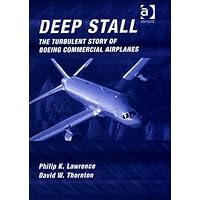
Average Reviews:

(More customer reviews)"DEEP STALL" is two books really: First, a nicely written and detailed history of commercial and military aircraft. From the Wright Brothers to the 787 Dreamliner, the authors know their stuff. Tid-bits of interest include the 707's brief designation as the "720" - something I for one never understood. Apparently it happened because Pan Am's president was superstition about an aircraft name with two 7's. To make the sale, Boeing changed "707" to "720" for a time.
BUT READER BEWARE: Deep Stall is ANOTHER book too: a Boeing hit piece. The authors obviously despise Boeing and rarely miss a chance to take a shot at their failures/percieved failures - while all the time treating Airbus with kid gloves. In defending Airbus on the still raging Euro-consortium subsidy issues, they accurately label Pentagon Boeing expenditures on R&D as "quasi-subsidies." But in their anti-Boeing zeal, they miss the boat by also labelling Pentagon aircraft PURCHASES as quasi-subsidies. It seems to me that when purchasing aircraft, the Pentagon is much more like a customer than a subsidy factory. And a finicky customer at that.
They lash out at the 747 as a impractical design that only succeeded because of pure-luck market shifts that its designers could not possibly have foreseen. They trash both the 757 and 767, while giving short notice to the wildly successful and innovative 777. But they save their deepest cuts for the 787 Dreamliner ... regarding the sleek look of the Dreamliner, "the futuristic look of the plane is fine for the drawing board and for Boeing P.R., but this look will be gone by the time of rollout," and, "Boeing's press releases trumpet the plane's cutting edge composite structure, but this is a fallacy. Every commercial aircraft built since the 1970s has included large portions of composite in airframe construction."
Overall - if you go in understanding the anti-Boeing bias, this book is a fine study of commercial aircraft, with a fascinating emphasis on how the ebb and flow of market forces has changed the industry over the decades.
Click Here to see more reviews about: Deep Stall: The Turbulent Story of Boeing Commercial Airplanes
"Deep Stall" applies a framework of strategic analysis to the Boeing Company. Boeing is the world's largest aerospace/defence company, with turnover in the region of US $60bn. The book examines the relative decline of Boeing in the civil aircraft market in relation to European manufacturer, Airbus. The aim of the book is to utilize the concept of strategic value to explain Boeing's decline. The authors define this concept as investment in people and technology to leverage future market success by developing innovative new products, arguing that Boeing has neglected strategic value in favour of shareholder value, defined in terms of short-term cash benefits. The rationale for the book exists both in the fact that the story in itself is interesting and also in the wider framework of analysis concerning the correct strategic approach for running a high technology business. The argument illustrates what can happen when quarterly returns become the predominant strategic rationale for a company. In the U.S. the business media (Economist, Forbes, Fortune, and Business Week etc) are now focusing on the question of Boeing's decline and the major implications for the U.S. national interest.Boeing is one of the jewels in the US technology crown, but today U.S. jobs and capability are being exported abroad, with most of its aircraft program work based in Asia. This is a hot topic in the US which explains why the business media are now so interested in this question. The book sits squarely in the centre of this debate. "Deep Stall" concludes with a brief analysis of the recent fight-back that has been evident in Boeing's fortunes and the successful campaign to sell the new 787. The authors probe the question of whether Airbus or Boeing is likely to dominate in the next ten or fifteen years.
Click here for more information about Deep Stall: The Turbulent Story of Boeing Commercial Airplanes

0 comments:
Post a Comment